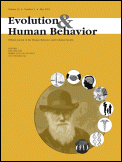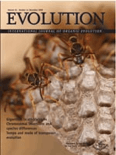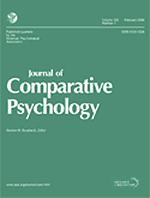
EVOLUTION AND HUMAN BEHAVIOR
Scope & Guideline
Unraveling the Complex Tapestry of Human Evolution
Introduction
Aims and Scopes
- Evolutionary Psychology:
The journal publishes studies that apply evolutionary theory to understand psychological processes and behaviors in humans, examining how these processes have been shaped by natural selection. - Cultural Evolution:
Research that investigates how cultural practices evolve over time and influence human behavior, including studies on social norms, traditions, and the transmission of knowledge. - Human Social Behavior:
Exploration of the social dynamics among humans, including cooperation, competition, altruism, and mate selection, often with an emphasis on the evolutionary underpinnings of these behaviors. - Cross-Cultural Comparisons:
The journal emphasizes comparative studies across different cultures to understand the variability and universality of human behaviors, informed by evolutionary perspectives. - Biological and Environmental Influences:
Research that examines how biological factors, such as genetics and hormones, and environmental conditions impact human behavior and social structures. - Methodological Diversity:
The journal encourages the use of various methodologies, including experimental, observational, and computational approaches, to investigate hypotheses related to human evolution and behavior.
Trending and Emerging
- Impact of Environmental Change on Behavior:
Research exploring how rapid environmental changes, such as climate change and urbanization, influence human behavior and social structures is gaining prominence, reflecting urgent global challenges. - Interdisciplinary Approaches to Human Behavior:
There is an increasing trend toward interdisciplinary research that combines insights from anthropology, psychology, biology, and sociology to provide a holistic understanding of human behavior. - Cultural Transmission and Learning Mechanisms:
Investigations into how cultural knowledge and practices are transmitted across generations are emerging as key themes, especially in the context of social learning and its evolutionary implications. - The Role of Emotions in Social Interactions:
Research focusing on the evolutionary functions of emotions and their role in shaping social interactions and cooperation is on the rise, highlighting the importance of emotional intelligence in human relationships. - Health and Reproductive Strategies:
Studies examining the interplay between health, reproductive strategies, and evolutionary pressures are increasingly relevant, particularly in light of ongoing public health challenges.
Declining or Waning
- Focus on Traditional Gender Roles:
Research explicitly centered on traditional gender roles and their evolutionary explanations appears to be declining, possibly due to a growing emphasis on gender fluidity and non-binary perspectives in contemporary research. - Static Models of Human Behavior:
There has been a noticeable reduction in studies that rely on fixed models of human behavior that do not account for cultural variability or adaptability, as the field moves toward more dynamic and context-sensitive approaches. - Overemphasis on Biological Determinism:
Papers that heavily emphasize biological determinism without considering sociocultural factors are becoming less common, reflecting a broader acceptance of the complexity of human behavior. - Narrow Focus on Mate Selection:
While mate selection remains a core topic, studies with a narrow focus on biological aspects of mate choice are being overshadowed by broader discussions that incorporate social, cultural, and economic dimensions.
Similar Journals

Anthropologie-International Journal of Human Diversity and Evolution
Innovating Perspectives on Human DiversityAnthropologie-International Journal of Human Diversity and Evolution is a prominent peer-reviewed journal published by the esteemed MORAVIAN MUSEUM in the heart of the Czech Republic. With a focus on anthropology, this journal serves as a vital platform for the dissemination of innovative research that explores human diversity and evolutionary studies. The journal operates under a rigorous academic framework and is categorized in the Q3 quartile for anthropology in 2023, reflecting its significance in the field. Although it does not currently offer open access options, Anthropologie facilitates the exchange of knowledge through its carefully curated articles spanning diverse topics within human evolution. Its Scopus ranking (320 out of 502 in social sciences) underscores its role as a relevant source for scholars and professionals alike, fostering dialogue and advancements in understanding human diversity. Researchers, students, and practitioners can look forward to engaging content that not only enlightens but also inspires further inquiry into anthropological studies.

AMERICAN JOURNAL OF PHYSICAL ANTHROPOLOGY
Championing Open Access for Anthropological DiscoveriesAMERICAN JOURNAL OF PHYSICAL ANTHROPOLOGY, published by Wiley, has established itself as a leading platform in the field of physical anthropology since its inception in 1918. This esteemed journal, identifiable by its ISSN 0002-9483 and E-ISSN 1096-8644, has been instrumental in disseminating groundbreaking research, achieving impressive rankings in both Social Sciences (Rank #18/443, 96th percentile) and Medicine (Rank #9/44, 80th percentile) categories within Scopus. Although its coverage in Scopus has concluded as of 2021, the journal continues to be a vital resource for academics and professionals seeking to explore the biological aspects of human evolution and variation. With a commitment to high-quality, peer-reviewed publications, the journal supports open access to enhance the visibility and accessibility of anthropological research globally. Researchers, students, and professionals are encouraged to engage with the innovative findings published in this journal, contributing to the ongoing dialogue in physical anthropology.

Evolutionary Psychological Science
Innovating Understanding in Evolutionary Psychology.Evolutionary Psychological Science, published by SpringerNature, is a critical platform in the field of social psychology, specifically tailored for researchers and professionals interested in the evolutionary perspectives that shape human behavior and societal interactions. Established in 2015 and set to continue its impact until 2024, this journal, with its E-ISSN 2198-9885, has garnered recognition within the academic community, achieving a notable Q2 ranking in social psychology, and securing a Scopus rank of #176 out of 310, placing it within the 43rd percentile. This open-access journal aims to disseminate innovative research that explores the interplay between evolutionary theory and psychological science, thereby enriching academic discourse and encouraging interdisciplinary collaboration. By providing a venue for rigorous scientific inquiry and practical applications, Evolutionary Psychological Science plays a vital role in advancing our understanding of human behavior through the lens of evolution.

EVOLUTION
Leading the Charge in Evolutionary BiologyEVOLUTION is a premier academic journal published by Oxford University Press, dedicated to the dynamic fields of evolutionary biology, ecology, and genetics. Since its inception in 1948, the journal has established itself as a leading platform for innovative research and critical analyses, achieving a remarkable impact factor that reflects its significance in the scientific community. EVOLUTION is consistently ranked in the Q1 category across key disciplines, including Agricultural and Biological Sciences, Ecology, and Genetics, making it a vital resource for researchers and practitioners alike. With an impressive Scopus ranking placing it in the 79th percentile for Agricultural and Biological Sciences and the 78th percentile for Ecology and Evolution, the journal is essential reading for those seeking to stay at the forefront of evolutionary studies. Although the journal does not currently offer open access options, it remains a crucial vehicle for disseminating cutting-edge research that influences the understanding of biological processes and their implications in diverse ecosystems. The commitment to rigor and excellence ensures that EVOLUTION continues to shape the discourse in evolutionary science and related fields.

Evolutionary Human Sciences
Advancing Knowledge at the Intersection of Evolution and HumanityEvolutionary Human Sciences, published by Cambridge University Press, is a premier open-access journal dedicated to exploring the multidisciplinary intersections of human evolution and behavior. Established in 2019, this journal has swiftly gained recognition, ranking in the Q1 category for Anthropology, Cultural Studies, and Ecology, Evolution, Behavior and Systematics, along with Q2 in Applied Psychology as of 2023. With a commendable Scopus ranking and impact factor reflecting its rigorous academic standards, Evolutionary Human Sciences provides a vital platform for researchers and professionals keen to advance the understanding of human behavior through the lens of evolutionary science. By offering a wealth of open access options, it ensures that groundbreaking research is readily available to scholars, students, and practitioners worldwide, fostering the dissemination of knowledge that is crucial for addressing contemporary challenges in human behavior and ecology.

BIOLOGY & PHILOSOPHY
Advancing Insights at the Intersection of Biology and PhilosophyBIOLOGY & PHILOSOPHY, published by SPRINGER, is a leading journal that explores the intricate and dynamic interplay between biology and philosophy. With an impressive impact factor in the Q1 category across multiple disciplines including Agricultural and Biological Sciences, History and Philosophy of Science, and Philosophy, this journal has firmly established itself as an essential resource for researchers, professionals, and students alike. Since its inception in 1986 and continuing through 2024, BIOLOGY & PHILOSOPHY fosters critical inquiry and discussion, inviting contributions that advance the understanding of biological sciences from philosophical perspectives. Although it operates under a traditional subscription model without Open Access options, its high Scopus rankings—#38 in Philosophy and #14 in History and Philosophy of Science—underscore its significance and influence in contemporary research. For those keen on delving deeper into the ethical, epistemological, and conceptual challenges posed by biological research, this journal serves as a compelling platform for groundbreaking scholarship.

JOURNAL OF COMPARATIVE PSYCHOLOGY
Unraveling the Mysteries of Animal BehaviorJOURNAL OF COMPARATIVE PSYCHOLOGY is a prestigious academic journal published by the American Psychological Association, dedicated to advancing the understanding of behavioral processes across diverse species. With its ISSN 0735-7036 and E-ISSN 1939-2087, the journal has been a cornerstone of comparative psychology research since its inception in 1983. It primarily caters to the fields of ecology, evolution, and behavior, ranking impressively in the Q2 quartile in the category of Ecology, Evolution, Behavior and Systematics, and Q3 in the miscellaneous Psychology category as of 2023. This journal serves as a vital platform for disseminating high-quality research, addressing both fundamental questions and applied issues in systematic studies of behavior across species. Although not open access, its rich repository of research articles, meta-analyses, and reviews makes it an indispensable resource for researchers, practitioners, and students striving to deepen their knowledge and foster innovation in comparative psychological studies. With a commitment to rigorous peer review and scholarly excellence, the JOURNAL OF COMPARATIVE PSYCHOLOGY is a key player in shaping the discourse within its field and driving future research.

JOURNAL OF HUMAN EVOLUTION
Exploring the Roots of Humanity's JourneyThe JOURNAL OF HUMAN EVOLUTION, published by ACADEMIC PRESS LTD - ELSEVIER SCIENCE LTD, is a premier academic journal focusing on the evolutionary biology of humans and their ancestors. With an esteemed Q1 ranking in the fields of Anthropology and Ecology, Evolution, Behavior and Systematics, this journal is a vital resource for researchers, professionals, and students dedicated to understanding human origins and evolutionary processes. The journal has been steadfastly contributing to the field since 1972, converging knowledge and insights through meticulously peer-reviewed articles. Additionally, it holds an impressive Scopus rank of #12/502 in Anthropology and #105/721 in Ecology, underlining its significant impact and prestige within the academic community. While the journal is not open access, its content remains accessible to those within institutional affiliations, fostering an environment rich in scholarly exchange and innovation. By disseminating cutting-edge research and comprehensive reviews, the JOURNAL OF HUMAN EVOLUTION continues to illuminate the complex narrative of human evolution and is essential reading for anyone engaged in this dynamic field.

HOMO-JOURNAL OF COMPARATIVE HUMAN BIOLOGY
Advancing Knowledge in Comparative AnthropologyHOMO - Journal of Comparative Human Biology is a prestigious academic journal dedicated to advancing the field of comparative human biology, offering a platform for researchers, professionals, and students to disseminate cutting-edge findings. Published by E Schweizerbart'sche Verlagsbuchhandlung in Germany, this journal has been a crucial resource since its inception in 1950, featuring a rich archive of studies until 2023. It holds a Q3 quartile ranking in Anthropology and a Q4 quartile ranking in Miscellaneous Medicine, reflecting its significance and influence within the academic community. Although not an Open Access journal, it provides a wealth of robust research that intersects with various disciplines within the anthropological sciences. Researchers looking for a wide array of comparative studies and insights into human biology will find HOMO an invaluable addition to their scholarly resources.

Nature Ecology & Evolution
Fostering transformative ideas for a sustainable future.Nature Ecology & Evolution is a premier journal that serves as a cornerstone for cutting-edge research in the dynamic fields of ecology, evolution, behavior, and systematics. Published by NATURE PORTFOLIO, this journal, with the ISSN 2397-334X, emphasizes high-quality, impactful studies that advance our understanding of ecological interactions and evolutionary processes. With an impressive Scopus ranking placing it in the 99th percentile—#6 out of 721 in Ecology, Evolution, Behavior and Systematics and #5 out of 461 in Environmental Science Ecology—it is classified as a Q1 journal, highlighting its significance in the research community. Established in 2016, it continues to foster an open dialogue among researchers and practitioners while facilitating the dissemination of transformative ideas that shape environmental policy and conservation strategies. While access to articles is restricted, the journal's robust impact factor underscores its relevance in scholarly discourse. Researchers, professionals, and students are encouraged to engage with the current trends and discoveries published in this leading journal, which thrives on addressing the challenges and complexities of our natural world.